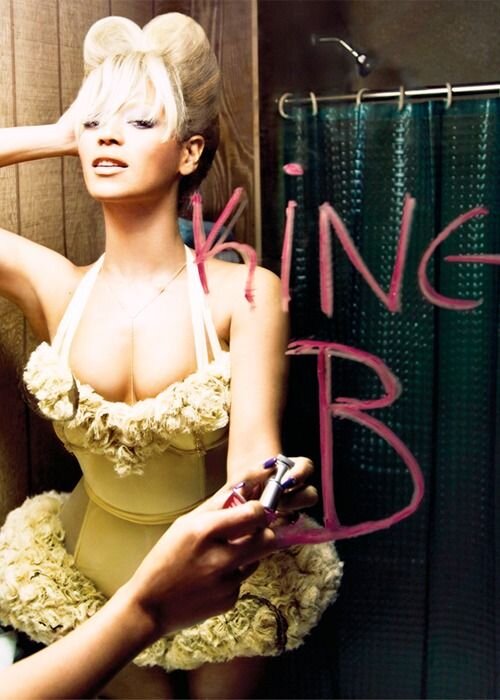King Kylie, King Bey, and Our Society's Complex Relationship with Femininity
So while I don't follow Kylie Jenner (or any of the Kardashians) on social media, I definitely do get a kick out of their family drama. But I always tell myself that my saving grace is that I can only read about it. I've tried to half watch the show once as I was cleaning my apartment in college, and even for TV background noise I couldn’t take it.
But in any case, I remember a year or two ago clicking on one of their articles, and seeing a photo of Kylie that the author embedded from her Instagram. And while the photo was stunning as usual, it was actually her Instagram name that had caught my full attention.
“King Kylie,” it read.
As someone who was in the process of developing a website that was built around the power of queens, I just couldn't help but feel a type of way about the fact that this very beautiful, powerful, strong young woman felt like the only title that could fully encapsulate that strength was a masculine one.
And she's not the first time I've seen it. Back in 2011, Beyoncé self referred to herself as "King B" on her album cover for the song, Best Thing I Never Had. It has also been very common amongst members of the Beyhive to refer to her as King Bey (and even I have done so myself in the past). But it wasn't until fairly recently that I stopped to ask myself why? Why did I, and these powerful women, along with many of their female/male fans feel the need to validate the legitimacy of their strength by giving them a masculine title?
Why do we still think that it's not as powerful to be considered a queen?
In an article published by the Atlantic a couple months ago, Sarah Rich highlights that one of the least discussed problems in feminism today is the way in which we still champion and over glorify what are seen to be traditionally masculine traits in men and women, even if those traits are problematic regardless of gender. She also sheds light on the issue of our social desire to demonize and chastise boys (and sometimes girls) who want to display more feminine qualities.
Rich notes that “there’s a word for what’s happening here: misogyny. When school officials and parents send a message to children that “boyish” girls are badass but “girlish” boys are embarrassing, they are telling kids that society values and rewards masculinity, but not femininity. They are not just keeping individual boys from free self-expression, but they are keeping women down too.”
“Why do we still think it’s not as powerful to be considered a queen?”
Adding to that, I would also say that our society has a habit of telling women that it is not strong or desirable to be emotionally feminine. Physical femininity is still an important value for women to maintain in the eyes of most people of both genders, but being too emotionally available, empathetic, or trusting has deep stigmas. The idea of “King Kylie” or "King Bey" is honestly a misogynist’s wet dream—and note that my usage of misogyny here is not code for men because women can also display misogynistic thinking as well.
In fact, one time while on a Buzzfeed video shoot in which I was training to become a firefighter, one of the female trainers told me to “stop running like a girl.” So here's the thing about this moment—I will totally 100% admit that I was running hella foolishly. But the fact that she equated my foolish running style to be representative of women as a whole is completely exemplary of how deeply embedded misogynistic thoughts can be in women as well.
Sure, call me out for running weirdly. I have no problem with that because it was the truth. But the disdain that she held for how I was running combined with the fact that she established it as being a feminine way of running is what made me very mad and uncomfortable. The comfort at which we as a society have for throwing shame on those that are more traditionally feminine, especially those that are emotionally feminine, is what I believe has led to more powerful women embracing the “King Kylie/King Bey” hybrid persona.
“King Kylie/King Bey” is the ultimate figment of our misogynistic imagination. She embodies all of the power, the strength, the ambition and the business prowess of a man while still displaying the physical presence of a soft, sexy, and desirable woman. And while I do think it is powerful for these two women to capitalize off of the power of their sexuality (especially given that men have been doing this for hundreds of years, and making billions of dollars off of exploiting female sexuality), it does bring up an important conversation about whether or not women can maintain a sense of legitimate power outside of a traditionally feminine, and hyper sexualized appearance.
Yes, Kylie Jenner and Beyoncé are powerful women, but they are also hyper-feminine representations of women. And their high-powered “king” status in the eyes of both men and women in society, while also maintaining that hyper-feminine representation underscores the difficult double consciousness of the female identity that many women find themselves struggling to uphold to get that same high powered success in the public eye.
We must always be the best of both worlds; uber masculine on the inside with a pretty feminine coating on the outside. To further articulate the point that Rich brings up in her article, yes, society champions boyish women more than girlish boys, but that is only when their physical representation is traditionally feminine.
We must always be the popular movie trope of the hot (white) girl who can out drink her guy friends in beer, while eating a cheeseburger, and talking sports or politics or business while still maintaining a very trim, feminine, and fit physique... and make it home in time to clean the house, and make dinner, and take care of the kids, and thrown down some bomb sex, and look fresh faced and alive through ALL of it.
King Kylie/King Bey is a persona that is meant to represent the ultimate power position for women in society, as they are both beautiful, sexy, constantly fresh faced, high-powered business women who are also loving moms and committed partners. And yet in a way, they both highlight how little power women still maintain in the eyes of society as not only do their public images imply how possible it should be to maintain a highly feminine appearance while running a business/having a family, but Beyoncé/Kylie’s “king” title appears to only be “respected” due to the maintenance of their very outwardly feminine appearance. And in many ways it's rather ironic that their king status is upheld despite being so outwardly feminine.
But for either of them to choose to appear as anything other than traditionally feminine, then their highly championed, inwardly masculine qualities of strength, power, ambition and business prowess would suddenly become weapons of their own mass destruction. If Kylie or Beyoncé chose to not shave for a week because they needed to get a pitch deck ready for a business meeting, instead of being met with kindness and understanding from the public, they would be dragged for letting work come before their appearance. But on the same token, if they did not give their pitch deck their all because they wanted to focus on maintaining their appearance, then they would be dragged for not being serious enough business women.
“King Kylie/Bey” is the ultimate symbol of our internal and external war against femininity. Within this complex power structure, to be a queen is to be both inwardly and outwardly feminine, and thus weak and undesirable. To be a queen is just a mere stepping stone; a holding ground until we are ready to ascend up to "true" power. And so this immediate desire to label strong and powerful women that we see in the media as kings instead of queens is a representation of how we as a society still don't respect femininity, both inwardly and outwardly.
Women that are both inwardly and outwardly feminine are seen as ditzy, dumb, weak, soft, vapid and/or vain, while women that are inwardly and outwardly masculine are seen as ugly, lesbian, bra-burning feminists. So, I see the appeal in building the “King Kylie/Bey” power persona that allows you to be this perfect amalgamation of masculinity and femininity.
In some ways it reminds me of my favorite identity theory by queer identity theorist, José Munõz, which is called disidentification. Within his famous book by the same title, Munõz outlines how critical it is for people to get to a place where they “dis-identify” with both the mainstream cultural norms, and the countercultural societal norms so as to develop one's own sense of individuality. The end goal is to be able to pick and choose aspects of both cultures that are uniquely you, and not toxic to your sense of self.
However, the biggest problem that I see with this “King Kylie/Bey” complex that I believe stunts the greater development of both men and women is that by choosing to champion more masculine traits within everyone, without critically reviewing and rejecting the more problematic traits of masculinity, nor amplifying the positive and beneficial aspects of femininity (like empathy, emotion, and communication), we are essentially emboldening everyone in society to become attractive, dusty-ass, trash-ass, trifling-ass, non-communicating-ass fuckboys that see deceit, aggression, and emotional detachment as badges of honor.
While there are many aspects of femininity that I am not a fan of, at the same time I also feel like part of my disdain with femininity is an effect of being raised within a patriarchal system. This system thrives on making women constantly feel inadequate about their place in society, and in my eyes, this is regardless of whether or not she is the perfect hybrid of being inwardly masculine and outwardly feminine.
Because even though Kylie Jenner devised and created a successful makeup company, her success is often never seen as legitimate or representative of hard work by most people because she is attractive. And there is a common assumption that attractive girls can’t be smart or work hard.
And even though Beyonce's success and hard work as a performer is very highly recognized in the public eye, her parenting choices, most notably with Blue Ivy and the styling of her hair, has constantly made her a target for unwarranted criticism about her having a stronger commitment to her work, and not her child.
“We are essentially emboldening everyone in society to become beautiful, dusty-ass, trash-ass, trifling-ass, non-communicating-ass fuckboys that see deceit, aggression, and emotional detachment as badges of honor.”
To me, it feels like society’s ultimate goal isn't even necessarily to celebrate building strong “boyish” women, but rather it is to uphold building insecure women; women who are constantly questioning whether or not they are pretty enough or work hard enough or are a good mom enough to maintain their positions of power.
Because even when we champion women’s inwardly masculine skills with their outwardly feminine appearances, the constant devaluation of the work of someone that leans more into a feminine appearance is also representative of a popular chorus that many women are familiar with; we can never win. And not only does it feel impossible to celebrate those with feminine attributes and qualities in the world of work and business, it is just as equally hard to find support for feminine qualities in personal relationships as well.
How many times have you heard after a guy breaks a woman’s heart in a heterosexual relationship that she just needs to be less attached? How many times have you been told that you just need to suck it up as a man would in a difficult situation, or ask less questions and seek less information?
Not wanting to be held accountable for your actions, disregarding the value of communication, stifling emotions, and unwarranted anger are all traits that are seen as traditionally masculine, but they are also nothing that I want to aspire towards embodying. And yet every day we tell women that the only way to make it in this world is to emulate the ways in which men act without critically thinking about how some of those actions that define maleness are actually just shitty and problematic as fuck.
We empower women to sleep around on unclear terms, and break other people’s hearts just as men have traditionally done without acknowledging the fact that maybe just sleeping around on unclear terms, and breaking other people's hearts is just a shitty trait that no one should have permission to get away with period. And this is not to imply shame at the idea of sleeping around, but rather to say that if you are sleeping around, and purposefully avoiding a conversation to outline the terms of your relationship, and just “keeping it casual” for the sake of looking disinterested and not clingy, then that’s trash all around—regardless of whether or not you are a man or woman.
But unfortunately, our society seems far more obsessed with the idea of getting revenge than it is on working towards actual healing and growth, and raising future children with the values that will allow them to be good and emotionally balanced people.
So as we continue to move forward as a critically conscious society that is trying to enact equality for all, I think that instead of championing young boys and girls to be more blanketly masculine, we need to encourage them to be strong and emotionally balanced people that can strive towards having power, ambition and success regardless of their gender expression. Just as strength, power, ambition and success should not be limited to one's gender, neither should deceit, aggression, or emotional detachment. As a collective, we should be fighting to abolish those qualities, rather than emboldening women to just act like the trash qualities that we don't like in men, and making tepid excuses about how it's okay when a woman does it.
We should be teaching young girls that there is power and strength within being feminine, either inwardly or outwardly or both; that they can strive to be queens, and that doesn't make them less important or serious than their male counterparts.
I love being traditionally feminine. I find strength in appearing as traditionally feminine, as well as embodying feminine characteristics of empathy, love, emotion, and communication. However, I will say that as far as appearances go, I am someone who will always put my work before my appearance, which is why I feel like I have a tricky relationship when it comes to fully identifying with being feminine.
But, internally, for many years, I strived to be like one of the boys, and to emotionally stunt myself. That is no longer the person that I want to be, nor the person that I want to encourage others around me to be—both male and female. But in order to do that, men and women need to acknowledge this very complex and shameful relationship that we have with traditionally feminine qualities, and appearances. Strength and power can exist within femininity as well.
Kylie and Beyoncé are more than free to identify as King Bey and King Kylie, but I can only hope that one day in the future, they (and society) will come to see them for the strong queens that they are.


